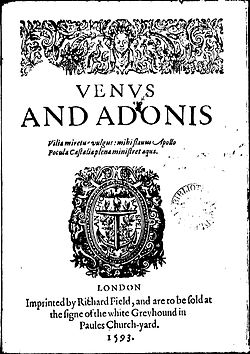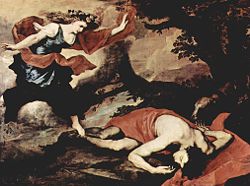Venus and Adonis (Shakespeare)

Venus and Adonis (English Venus and Adonis ) is an epic poem by William Shakespeare , which was probably written in 1592 .
publication
Venus and Adonis was entered in the Stationers' Register of the Unauthorized Guild of Printers, Publishers and Booksellers on April 18, 1593 and was published in a four-high edition by Richard Field, a Stratford-upon-Avon publisher, in the fall of the same year and was published. Field brought out a second quarto in 1594 , but then transferred its rights to John Harrison, who published the first edition of The Rape of Lucrece that same year . Up to 1640, sixteen other editions by various editors are documented by Venus and Adonis , which is why one can assume that the epic was one of the great successes of its time.
Historical background
Venus and Adonis is now considered the first printed work under the name Shakespeare ( "the first heire of my invention" ). Shakespeare dedicated the poem to Henry Wriothesley , Earl of Southampton. It was submitted for print anonymously in the Stationers' Register in April 1593 and first appeared in September 1593. The name Shakespeare only appears at the end of the dedication. A year later Shakespeare's second verse epic The Rape of Lucrece appeared , which at the end of the work is also dedicated to Henry Wriothesley, the Earl of Southampton.
Source and literary background
The work is based on the story of Venus and Adonis in Book 10 of Ovid's Metamorphoses , where - unlike Shakespeare - Adonis reciprocates Venus' love. Ovid tells how Venus made the beautiful Adonis her first mortal lover. Both hunted together for a long time until Venus tried to dissuade Adonis from hunting dangerous animals. However, this ignores their warning and is ultimately killed by a boar. Shakespeare turned this story into an epic with 1,194 lines. His fundamental innovation was that he had Adonis Venus' offer to devote himself to him rejected.
action

Venus fell in love with the beautiful Adonis . She is sick with love, lifts her lover from the saddle of his horse, showering him with kisses and beautiful words. But nothing she does or says can arouse his sexual desire - which he denies. Adonis announces that he will go hunting for a boar the next morning . Venus tries to dissuade him and convince him to hunt tamer animals instead. But he ignores her requests and rushes off. She spends the rest of the night wailing , and at dawn she hears the start of the hunt and the dogs barking. Worried, she rushes over, knowing that the noise comes from the place where the hunters have caught an animal that makes no move to flee. She finds Adonis' body, fatally pierced by the boar's tusks. In her horror and suffering, the goddess of love utters a curse on them: that love will always end terribly, and that those who like her love the most must experience the greatest suffering. Adonis' body melts away, a red and white flower grows in its place, which Venus picks.
Genre
Shakespeare's poem is referred to as the Epyllion , a little epic about sexual love. Thomas Lodge introduced the genre with his Glaucus and Scilla (1589).
Text output
- William Shakespeare: "Venus and Adonis" and "Tarquin and Lucretia" in the translation by Heinrich Christoph Albrecht (1783) , ed. & Einl. Christa Jansohn, series: Studies on English literature, 22nd 2007, ISBN 978-3-8258 -0685-9
- William Shakespeare: "Venus and Adonis" & "Tarquin and Lucretia". Süddeutsche Zeitung , Anna Amalia Library , Munich 2007 ISBN 3866154062
- Bilingual: Reclams Universal Library , 2003 ISBN 3150182557
Audio book
- Venus and Adonis. Tarquin and Lucretia . Two poems. Bibliotheca Anna Amalia , 3. Der Audio Verlag , 2007 ISBN 9783898136358 (in German). With booklet
- Venus and Adonis . NOA NOA audio book edition, Munich 2014, ISBN 978-3-932929-82-3 .
Web links
Individual evidence
- ^ William J. Kennedy: Shakespeare and the Development of English Poetry . In: The Cambridge Companion to Shakespeare's Poetry . Ed. by Patrick Cheney. Cambridge University Press, Cambridge, 2007, pp. 16f .; Heather Dubrow: Captive Victors. Shakespeare's Narrative Poems and Sonnets . Cornell Univ. Press, Ithaca 1987.
- ↑ Audiobook of this edition see below
- ↑ The ISBN is valid for 9 different titles, as one cassette